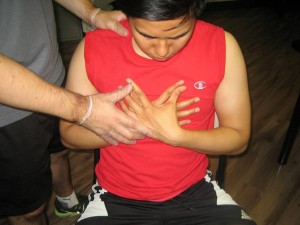Tachycardia is a fast heart rate specifically classified as heart rate exceeding 100 beats per minute while at rest. Generally, if left untreated, it can result to serious complications including stroke, heart failure, sudden cardiac arrest or death.
https://www.youtube.com/watch?v=xAfj5AHxC2I
Types of tachycardia
- Atrial fibrillation is a fast heart rate due to disordered, uneven electrical impulses in the atria.
- Atrial flutter – the atria beats very fast but at a regular rate.
- Supraventricular tachycardia – an abnormal fast heart rate that originates above the ventricles.
- Ventricular tachycardia – fast heart beat that starts with irregular electrical signals in the ventricles
- Ventricular fibrillation – fast, chaotic electrical impulses that results to quivering of the ventricles instead of pumping blood to the body. Generally, this usually happen during or after a heart attack.
Symptoms

- At first, lightheadedness
- Shortness of breath
- Fast pulse rate
- In addition, pain or discomfort in the chest
- Heart palpitations
- Lastly, fainting or syncope
Causes
- Abnormal electrical pathways in the heart present at birth
- Damage to the tissues of the heart caused by heart diseases
- Anemia
- Exercise
- Disease or congenital abnormality of the heart
- High or low blood pressure
- Sudden stress
- Smoking
- Fever
- Side effects of medication
- Excessive alcohol drinking
- Excessive drinking of caffeinated drinks
- Abuse of cocaine
- Imbalance of electrolytes
- Lastly, overactive thyroid or hyperthyroidism
Treatment
- Avoid consumption of stimulants such as caffeinated tea or coffee, soda drinks and energy boosters to prevent tachycardia
- Increase the intake of potassium. Generally, deficiency in potassium can cause tachycardia. Another alternative is to take the prescribed potassium supplements. Foods rich in potassium include potatoes, bananas, whole grains and vegetables.
- Eat plenty of fiber to eliminate all fatty deposits called ‘arterial plaque’ in the arteries which results to cholesterol and high blood pressure.
- In addition, drink plenty of water to prevent dehydration
- Lastly, perform mild cardiovascular exercises to lessen the symptoms of tachycardia by strengthening through training. Generally, gradually increase the amount of aerobic exercises with the help of a therapist.
Tips
- Maintain a healthy weight to prevent the risk of developing a heart disease.
- Generally, live a heart-healthy routine by performing regular exercises and eating a healthy, low-fat diet that includes a variety of fruits and vegetables and whole grains.
- Maintain the blood pressure and cholesterol level under control.
- Quit smoking.
- Lastly, minimize drinking of alcoholic drinks.
More Information
The details posted on this page on tachycardia is for learning purposes only. To learn to recognize and manage circulatory conditions including tachycardia, enroll in a first aid course with one of our training providers.
FACT CHECK
https://en.wikipedia.org/wiki/Tachycardia
https://www.webmd.com/heart-disease/atrial-fibrillation/what-are-the-types-of-tachycardia#1
https://www.mayoclinic.org/diseases-conditions/tachycardia/symptoms-causes/syc-20355127
